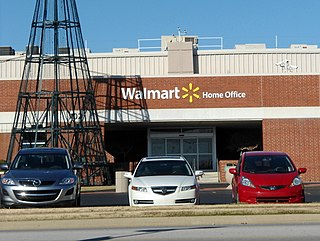
Walmart Inc. is an American multinational retail corporation that operates a chain of hypermarkets, discount department stores, and grocery stores from the United States, headquartered in Bentonville, Arkansas. The company was founded by Sam Walton in nearby Rogers, Arkansas in 1962 and incorporated under Delaware General Corporation Law on October 31, 1969. It also owns and operates Sam's Club retail warehouses.

The May Department Stores Company was an American department store holding company, formerly headquartered in downtown St. Louis, Missouri. It was founded in Leadville, Colorado, by David May in 1877, moving to St. Louis in 1905. After many changes in the retail industry, the company merged with Federated Department Stores in 2005.

Frank Winfield Woolworth was an American entrepreneur, the founder of F. W. Woolworth Company, and the operator of variety stores known as "Five-and-Dimes" which featured a selection of low-priced merchandise. He pioneered the now-common practices of buying merchandise directly from manufacturers and fixing the selling prices on items, rather than haggling. He was also the first to use self-service display cases, so that customers could examine what they wanted to buy without the help of a sales clerk.

Macy's is an American chain of high-end department stores founded in 1858 by Rowland Hussey Macy. It became a division of the Cincinnati-based Federated Department Stores in 1994, through which it is affiliated with the Bloomingdale's department store chain; the holding company was renamed Macy's, Inc. in 2007. As of 2015, Macy's was the largest U.S. department store company by retail sales.
Mervyn's was an American middle-scale department store chain based in Hayward, California, and founded by Mervin G. Morris (1920–2021). It carried national brands of clothing, footwear, bedding, furniture, jewelry, beauty products, electronics, and housewares. Many of the company's stores were opened in shopping malls; however, some locations were operated independently. Based on 2005 revenue, Mervyn's was the 83rd largest retailer in the United States.
Waldenbooks, operated by the Walden Book Company, Inc., was an American shopping mall-based bookstore chain, from 1995 as a subsidiary of Borders Group. The chain also ran a video game and software chain under the name Waldensoftware, as well as a children's educational toy chain under Walden Kids. In 2011, the chain was liquidated in bankruptcy.

The Aaron's Company is an American lease-to-own retailer. The company focuses on leases and retail sales of furniture, electronics, appliances, and computers. The company sells through the company-operated and franchised stores, e-commerce platform (Aarons.com)
Payless is an international discount footwear chain. Established in 1956 by cousins Louis and Shaol Pozez, Payless was a privately held company owned by Blum Capital, and Golden Gate Capital. In 1961, it became a public company as the Volume Shoe Corporation which merged with The May Department Stores Company in 1979. In the 1980s, Payless was widely known in the U.S. for its Pro Wings line of discount sneakers, which often had Velcro straps instead of laces. In 1996, Payless became an independent publicly held company. In 2004, Payless announced it would exit the Parade chain and would close 100 Payless Shoe outlets. On August 17, 2007, the company acquired the Stride Rite Corporation and changed its name to Collective Brands, Inc. The company had a total revenue for 2011 of US$ 3.4 billion. The company also has a stunt premium banner, Palessi Shoes. Payless is currently owned by a group of investors led by Alden Global Capital and Axar Capital Management.

An independent bookstore is a retail bookstore which is independently owned. Usually, independent stores consist of only a single actual store. They may be structured as sole proprietorships, closely held corporations or partnerships, cooperatives, or nonprofits. Independent stores can be contrasted with chain bookstores, which have many locations and are owned by large corporations, which often have other divisions besides bookselling.

Sentry Foods is a grocery store chain with a total of 11 stores, all in Wisconsin.
Justice is an online (shopjustice.com) clothing and lifestyle retailer targeting the tween girl market, formerly owned by Tween Brands, Inc., later by Ascena Retail Group, and currently by Bluestar Alliance LLC.
O’Reilly Automotive, Inc. is an American auto parts retailer that provides automotive aftermarket parts, tools, supplies, equipment, and accessories to professional service providers and do-it-yourself customers. Founded in 1957 by the O’Reilly family, the company operates more than 5,600 stores in 47 states, and 22 ORMA stores in Mexico.
Steve & Barry's was an American retail clothing chain, featuring casual clothing, footwear and accessories. By mid-2008, the chain operated 276 stores in 39 states. The company was headquartered in Port Washington, New York. The company liquidated all of its stores throughout 2008 and 2009.
AppleTree Markets was a supermarket chain in Texas formed in 1969 when Safeway opened its first stores in Houston, which were spun off under the AppleTree name in 1988. The division once had 100 stores in Greater Houston and Greater Austin. By January 21, 2002, AppleTree had reduced its holdings to two stores in Bryan, Texas, where it had shifted its headquarters. One of the remaining locations was sold in 2009 and the final location, in Bryan at Highway 21 and Texas Avenue, closed in early 2012, marking the end of the chain.
Linens 'n Things was a Clifton, New Jersey-based big-box retailer specializing in home textiles, housewares, and decorative home accessories. The chain operated 571 stores in 47 U.S. states and six Canadian provinces, and had 7,300 employees as of December 2006. The company's business strategy was "to offer a broad selection of high quality, brand name home furnishings merchandise at exceptional everyday values, provide superior guest service, and maintain low operating costs."

Christopher & Banks is an American retail company. Originally headquartered in the Minneapolis suburb of Plymouth, Minnesota, it specializes in women's clothing for the age 40-60 demographic. In January 2021, the company filed for bankruptcy and closed all stores due to financial loss from the ongoing COVID-19 pandemic. Following the bankruptcy and closures, Christopher & Banks' assets and intellectual property were acquired by Eden Prairie-based iMedia Brands. Since the acquisition, online retail for the company has resumed, as well as five brick-and-mortar locations.

Times Supermarkets is an American supermarket chain headquartered in Honolulu, Hawaii. Times operates 24 stores throughout the state of Hawaiʻi, 17 using the Times name, five operating under the Big Save brand, one specialty food/liquor store under the Fujioka's Wine Times name, and one location operating as Shima's Supermarket in Waimānalo.
Interstate Department Stores, Inc., was an American holding company for a chain of small department stores, founded in Delaware in 1928. After a very rapid expansion as the result of acquisition and expansion of two discount store chains acquired in 1959 and 1960 and also two toy store chains acquired in 1967 and 1969, the firm was renamed in 1970 as Interstate Stores, Inc., to better reflect its business. Increased competition and the changes in consumer buying habits eventually led to decreased sales in the late 1960s and early 1970s which forced the firm to file for bankruptcy in 1974. After shedding all of its non-performing units, the firm was able to exit bankruptcy with the entire toy division intact along with a small remnant of the department store division in 1978. The firm was renamed Toys "R" Us upon emergence from bankruptcy.









